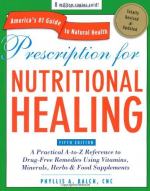|
This section contains 983 words (approx. 4 pages at 300 words per page) |

|
Vitamins are organic components in food that are needed in very small amounts for growth and for maintaining good health. The vitamins include vitamin D, vitamin E, vitamin A, and vitamin K, or the fat-soluble vitamins, and folate (folic acid), vitamin B12, biotin, vitamin B6, niacin, thiamin, riboflavin, pantothenic acid, and vitamin C (ascorbic acid), or the water-soluble vitamins. Vitamins are required in the diet in only tiny amounts, in contrast to the energy components of the diet. The energy components of the diet are sugars, starches, fats, and oils, and these occur in relatively large amounts in the diet.
Most of the vitamins are closely associated with a corresponding vitamin deficiency disease. Vitamin D deficiency causes rickets, a disease of the bones. Vitamin E deficiency occurs only very rarely, and causes nerve damage. Vitamin A deficiency is common throughout the poorer parts of the world, and causes...
|
This section contains 983 words (approx. 4 pages at 300 words per page) |

|


